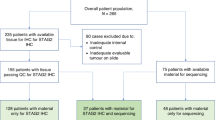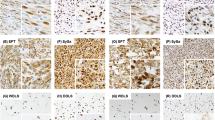Abstract
The aim of this study was to investigate the level and the prognostic value of the expression of different survivin transcript variants – survivin, survivin-ΔEx3 and survivin-2B – in tumours of 76 soft tissue sarcoma (STS) patients. The expression of survivin transcript variants in STS tissue samples and in 12 nonmalignant control tissues was analysed by quantitative RT–PCRs. Expression levels of all survivin transcript variants were strongly elevated in STS compared to normal tissues. A positive correlation between expression of splice variants and tumour stage was found (P=0.02; χ2 test). The multivariate Cox's proportional hazards regression model revealed a 7.3-fold increased risk of tumour-related death for patients with survivin-ΔEx3 overexpressing tumours (P=0.007). The effect of surivivin (wildtype variant) and survivin-2B was less pronounced but still significant (2.2- and 1.9-fold, resp., P<0.05 each). Our results show for the first time that mRNA expression of survivin-variants is significantly correlated to a poor prognosis for STS patients, and we suggest expression of survivin splice variants together with tumour stage as independent predictor of survival.
This is a preview of subscription content, access via your institution
Access options
Subscribe to this journal
Receive 50 print issues and online access
$259.00 per year
only $5.18 per issue
Buy this article
- Purchase on Springer Link
- Instant access to full article PDF
Prices may be subject to local taxes which are calculated during checkout

Similar content being viewed by others
Abbreviations
- STS:
-
soft-tissue sarcoma(s)
- PBS:
-
phosphate-buffered saline
- CI 95%:
-
confidence interval
References
Altieri DC . (2003). Oncogene, 22, 8581–8589.
Badran A, Yoshida A, Ishikawa K, Goi T, Yamaguchi A, Ueda T and Inuzuka M . (2004). Biochem .Biophys. Res. Commun., 314, 902–907.
Fangusaro JR, Jiang Y, Holloway MP, Caldas H, Singh V, Boue DR, Hayes J and Altura RA . (2005). Br. J. Cancer, 92, 359–365.
Hirohashi Y, Torigoe T, Maeda A, Nabeta Y, Kamiguchi K, Sato T, Yoda J, Ikeda H, Hirata K, Yamanaka N and Sato N . (2002). Clin. Cancer Res., 8, 1731–1739.
Islam A, Kageyama H, Takada N, Kawamoto T, Takayasu H, Isogai E, Ohira M, Hashizume K, Kobayashi H, Kaneko Y and Nakagawara A . (2000). Oncogene, 19, 617–623.
Kappler M, Köhler T, Kampf C, Diestelkötter P, Würl P, Schmitz M, Bartel F, Lautenschläger C, Rieber EP, Schmidt H, Bache M, Taubert H and Meye A . (2001). Int. J. Cancer (Pred. Oncol.), 95, 360–363.
Krieg A, Mahotka C, Krieg T, Grabsch H, Muller W, Takeno S, Suschek CV, Heydthausen M, Gabbert HE and Gerharz CD . (2002). Br. J. Cancer, 86, 737–743.
Li F . (2003). J. Cell Physiol., 197, 8–29.
Mahotka C, Krieg T, Krieg A, Wenzel M, Suschek CV, Heydthausen M, Gabbert HE and Gerharz CD . (2002a). Int. J. Cancer, 100, 30–36.
Mahotka C, Liebmann J, Wenzel M, Suschek CV, Schmitt M, Gabbert HE and Gerharz CD . (2002b). Cell Death Differ., 9, 1334–1342.
Mahotka C, Wenzel M, Springer E, Gabbert HE and Gerharz CD . (1999). Cancer Res., 59, 6097–6102.
Nakagawa Y, Yamaguchi S, Hasegawa M, Nemoto T, Inoue M, Suzuki K, Hirokawa K and Kitagawa M . (2004). Leuk. Res., 28, 487–494.
O'Driscoll L, Linehan R, Kennedy M, Cronin D, Purcell R, Glynn S, McDermott W, Hill D, O'H J, Parkinson M and Clynes M . (2003). Cancer Lett., 201, 225–236.
Ryan B, O'Donovan N, Browne B, O'Shea C, Crown J, Hill AD, McDermott E, O'Higgins N and Duffy MJ . (2005). Br. J. Cancer, 92, 120–124.
Velculescu VE, Madden SL, Zhang L, Lash AE, Yu J, Rago C, Lal A, Wang CJ, Beaudry GA, Ciriello KM, Cook BP, Dufault MR, Ferguson AT, Gao Y, He TC, Hermeking H, Hiraldo SK, Hwang PM, Lopez MA, Luderer HF, Mathews B, Petroziello JM, Polyak K, Zawel L and Kinzler KW . (1999). Nat. Genet., 23, 387–388.
Würl P, Kappler M, Meye A, Bartel F, Köhler T, C. Lautenschlager C, Bache M, Schmidt H and Taubert H . (2002). Lancet, 359, 943–944.
Yamada Y, Kuroiwa T, Nakagawa T, Kajimoto Y, Dohi T, Azuma H, Tsuji M, Kami K and Miyatake S . (2003). J. Neurosurg., 99, 738–745.
Acknowledgements
We appreciate the contributions of other members of our laboratory: Birgit Wypior, Ute Rolle and Kathrin Spröte. The work in the authors' laboratory is supported by the Land Sachsen-Anhalt (Grant Number 3347A/0021B) and the NBL-3/W. Roux-program (Grant Number FKZ: 4/18). FB was supported by a grant from the Deutsche Krebshilfe (Grant 10-2130-Ta2) and KB was supported by a grant from the Chiron Behring GmbH & Co. (Marburg, Germany).
Author information
Authors and Affiliations
Corresponding author
Rights and permissions
About this article
Cite this article
Taubert, H., Kappler, M., Bache, M. et al. Elevated expression of survivin-splice variants predicts a poor outcome for soft-tissue sarcomas patients. Oncogene 24, 5258–5261 (2005). https://doi.org/10.1038/sj.onc.1208702
Received:
Revised:
Accepted:
Published:
Issue Date:
DOI: https://doi.org/10.1038/sj.onc.1208702
Keywords
This article is cited by
-
MRI detection of the malignant transformation of stem cells through reporter gene expression driven by a tumor-specific promoter
Stem Cell Research & Therapy (2021)
-
Novel miRNA-mRNA interactions conserved in essential cancer pathways
Scientific Reports (2017)
-
Targeting survivin as a potential new treatment for chondrosarcoma of bone
Oncogenesis (2016)
-
Survivin gene-expression and splicing isoforms in oral squamous cell carcinoma
Journal of Cancer Research and Clinical Oncology (2009)
-
The clinical significance of splice variants and subcellular localisation of survivin in non-small cell lung cancers
British Journal of Cancer (2008)



